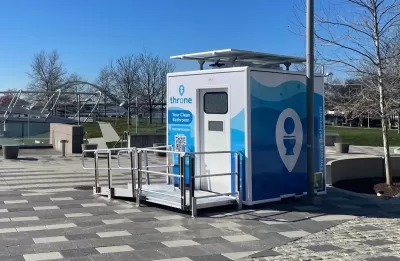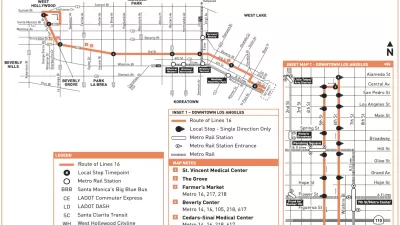The city’s transit stations are notoriously devoid of restrooms, shade, and other amenities while riders face long waits.

In response to consistent complaints about the lack of restroom facilities at Los Angeles public transit stations, a six-month pilot program in Los Angeles is “testing three portable, self-contained bathroom units last week at Metro's busiest train stations: Westlake/MacArthur Park on the B (Red)/D (Purple) Lines; Willowbrook/ Rosa Parks on the A (Blue)/C (Green) Lines; and the Norwalk station on the C Line.” Steve Scauzillo of The Whittier Daily News reports on the story in an article published in Mass Transit.
The program was proposed by Throne, a Washington, D.C.-based portable bathroom producer whose system “only allows access via a cell phone to unlock the door. And there's a 10-minute time limit on using the facility.” This will presumably bar people without access to cell phones.
As Scauzillo points out and Planetizen covered previously, “The shortage of public restrooms in the United States is acute. According to the Public Restroom Index, the U.S. has eight per 100,000 people. That is tied with Botswana.”
Transit agencies cite “cost and misuse” as top reasons for not providing bathrooms. According to Throne co-founder Jessica Heizelman, “Throne gets around the cost of hooking pipes to water and sewer lines by making its bathrooms self-contained. They have their own water and sewer tanks. And power comes from solar panels.”
According to Metro’s The Source, “Toilets will generally be open 6 a.m. to 9 p.m. seven days a week.” Metro adds, “We expect to learn much from the pilot, specifically how the public toilets perform, the demand for them and public acceptance. The findings will help guide us when it comes to public restrooms in the future.”
FULL STORY: CA: Toilets at LA Metro train and bus stations are very rare, but four are being tested at busy stops

Alabama: Trump Terminates Settlements for Black Communities Harmed By Raw Sewage
Trump deemed the landmark civil rights agreement “illegal DEI and environmental justice policy.”

Planetizen Federal Action Tracker
A weekly monitor of how Trump’s orders and actions are impacting planners and planning in America.

The 120 Year Old Tiny Home Villages That Sheltered San Francisco’s Earthquake Refugees
More than a century ago, San Francisco mobilized to house thousands of residents displaced by the 1906 earthquake. Could their strategy offer a model for the present?

In Both Crashes and Crime, Public Transportation is Far Safer than Driving
Contrary to popular assumptions, public transportation has far lower crash and crime rates than automobile travel. For safer communities, improve and encourage transit travel.

Report: Zoning Reforms Should Complement Nashville’s Ambitious Transit Plan
Without reform, restrictive zoning codes will limit the impact of the city’s planned transit expansion and could exclude some of the residents who depend on transit the most.

Judge Orders Release of Frozen IRA, IIJA Funding
The decision is a victory for environmental groups who charged that freezing funds for critical infrastructure and disaster response programs caused “real and irreparable harm” to communities.
Urban Design for Planners 1: Software Tools
This six-course series explores essential urban design concepts using open source software and equips planners with the tools they need to participate fully in the urban design process.
Planning for Universal Design
Learn the tools for implementing Universal Design in planning regulations.
Clanton & Associates, Inc.
Jessamine County Fiscal Court
Institute for Housing and Urban Development Studies (IHS)
City of Grandview
Harvard GSD Executive Education
Toledo-Lucas County Plan Commissions
Salt Lake City
NYU Wagner Graduate School of Public Service





























